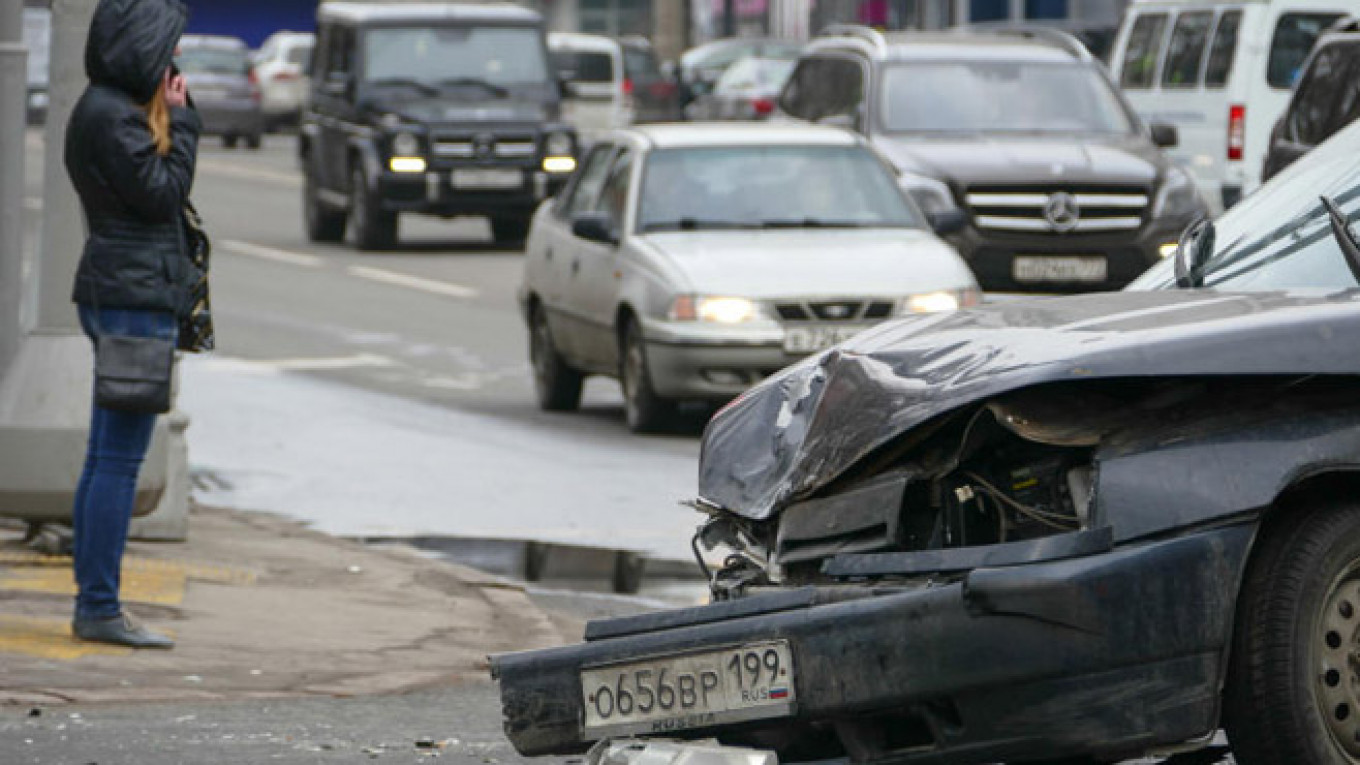Correction appended.
Russia's poorest may be forced off the road thanks to a 40 percent rise in car insurance premiums this year, but the knock is unlikely to make much of a difference to Russia's already ravaged car market.
The Central Bank on April 12 raised the base price of government-mandated insurance by 40 percent from 2,440-2,574 rubles ($45-47) to 3,432-4,118 rubles ($64-76) per year in a long-delayed move to bring premiums in line with incomes and car repair costs.
Drivers also pay a surcharge depending on what region they live in, meaning that in some parts of Russia the base cost has more than doubled. Insurance companies are allowed to charge 20 percent over the base price. The result is to push up drivers' bills as much as 60 percent.
Those on fixed incomes, such as the unemployed or retired, have been hit hard. President Vladimir Putin during a live call-in show took a call from Galina Zagorskaya, a pensioner from Blagoveshchensk in Russia's Far East.
Zagorskaya told Putin her pension is 14,000 ($263) per month but that insurance payments had risen by 10,000-12,000 rubles a year following the April 10 hike.
"Our car is our meal ticket, it takes us to our garden-plot. How can we manage to live on … our pensions?" she asked.
Putin promised that he would "absolutely ask both the Central Bank and government" to look into the matter. But the logic behind the price rise stood, he said.
That logic is a shock to the Russian system. The minimum base car insurance tariff was already raised by 25 percent in October, from 1,980 rubles ($36) to 2,440 rubles ($45) — the first correction to minimum insurance rates in 11 years.
The increases come as insurers' liabilities grow. Maximum insurance payouts to people injured in road accidents were raised from 160,000 rubles ($3,000) to 500,000 rubles ($9,000) on April 1. The weak ruble, which has fallen by about 40 percent against the U.S. dollar since the start of last year on the back of low oil prices and Western sanctions, has also made imported spare parts more expensive, driving up the cost of insurance claims.
Bigger Problems
The car industry, meanwhile, has bigger problems than the rising cost of driving, said Vladimir Bespalov, a car industry analyst at VTB Capital.
Car sales fell 42.5 percent year-on-year in March, according to the Association of European Businesses, a lobby group. The slowdown in sales was driven both by the ruble's drop and economic uncertainty as Russia braces for an economic contraction of up to 5 percent this year.
Against the backdrop of these uncertainties, higher insurance rates barely affect car sales, said Azat Timerkhanov, lead analysts at analytics agency Autostat.
"When a person is ready to spend a couple hundred thousand rubles on buying a car, it's difficult to imagine that he'd be bothered by the need to put down a few more thousand rubles for insurance," Timerkhanov said.
Pressure on the Poor
But even if the rate rise will have little effect on the car market, it is yet another weight on Russia's already struggling poor. Average wages stood at just 33,205 rubles ($616) a month in March, a 9.3 percent drop from the same month last year, according to state statistics service Rosstat. Year-on-year inflation hit 16.9 percent in March.
A World Bank report published in early April sees the number of Russians below the poverty line, which is marked at 8,234 rubles ($153) a month, rising to hit 11.2 percent of the population by the end of the year. For those below this line, insurance payments of even 4,000 rubles a year are unsustainable.
Government action on car insurance is unlikely, though, experts said. "When the population's discontent becomes widespread, then, maybe, the government will do something. But the probability of [government action] is extremely low," Timerkhanov said.
Bespalov said the hike was actually a compromise between drivers and insurance companies, especially given the rising price of replacement parts for imported cars following the ruble's devaluation. Even with the rate hike, insurers still believe they are working "on the verge of unprofitability," Bespalov said.
Correction: An earlier version of this article said the base price of car insurance had been raised from 2,574 rubles to 4,118 rubles ($76) per month. In fact, these amounts relate to the cost of a year's insurance. The insurance prices have also been adjusted to show the permitted range, rather than just the maximum price. The article also referred to fines for road accidents rising from 160,000 rubles to 500,000 rubles. In fact, these are maximum insurance payouts.
Contact the author at [email protected]
A Message from The Moscow Times:
Dear readers,
We are facing unprecedented challenges. Russia's Prosecutor General's Office has designated The Moscow Times as an "undesirable" organization, criminalizing our work and putting our staff at risk of prosecution. This follows our earlier unjust labeling as a "foreign agent."
These actions are direct attempts to silence independent journalism in Russia. The authorities claim our work "discredits the decisions of the Russian leadership." We see things differently: we strive to provide accurate, unbiased reporting on Russia.
We, the journalists of The Moscow Times, refuse to be silenced. But to continue our work, we need your help.
Your support, no matter how small, makes a world of difference. If you can, please support us monthly starting from just $2. It's quick to set up, and every contribution makes a significant impact.
By supporting The Moscow Times, you're defending open, independent journalism in the face of repression. Thank you for standing with us.
Remind me later.






